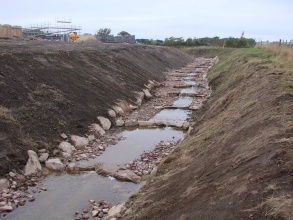Case study:Mains of Dyce: Difference between revisions
No edit summary |
No edit summary |
||
| (11 intermediate revisions by one other user not shown) | |||
| Line 1: | Line 1: | ||
{{Case study status | {{Case study status | ||
|Approval status= | |Approval status=Approved | ||
}} | }} | ||
{{Location | {{Location | ||
| Line 9: | Line 9: | ||
|Themes=Hydromorphology | |Themes=Hydromorphology | ||
|Country=Scotland | |Country=Scotland | ||
|Main contact forename= | |Main contact forename=Hamish | ||
|Main contact surname= | |Main contact surname=Moir | ||
|Contact organisation= | |Contact organisation=cbec eco engineering | ||
|Contact organisation url=www.cbecoeng.co.uk/ | |||
|Multi-site=No | |Multi-site=No | ||
|Project picture=MainsofDyce newlycompleted.jpg | |||
|Picture description=Mains of Dyce, newly completed. Photograph courtesy of cbec eco engineering | |||
|Project summary=SEPA required the culverted channel to be “re-daylighted”. The overarching aim was to restore catchment scale processes as much as possible, taking a long term sustainable rather than quick fix approach. | |Project summary=SEPA required the culverted channel to be “re-daylighted”. The overarching aim was to restore catchment scale processes as much as possible, taking a long term sustainable rather than quick fix approach. | ||
Constraints on the scale of restoration included: large housing development close by, lack of a catchment scale management plan, lack of funding and knowledge. | Constraints on the scale of restoration included: large housing development close by, lack of a catchment scale management plan, lack of funding and knowledge. | ||
Housing developer initially carried out works, resulting in an unstable channel design. Two one in ten year flooding events which occurred in 2009 caused severe incision of the channel up to 2.7 meters, which in total was estimated to have removed 539m3 of material. | Housing developer initially carried out works, resulting in an unstable channel design. Two one in ten year flooding events which occurred in 2009 caused severe incision of the channel up to 2.7 meters, which in total was estimated to have removed 539m3 of material. | ||
cbec eco engineering was subsequently contracted to re-design the channel. Step-pool design was chosen based on modelling. Works included bed and bank profiling, and step construction from boulders and smaller cobbles/gravels. | cbec eco engineering was subsequently contracted to re-design the channel. Step-pool design was chosen based on modelling. Works included bed and bank profiling, and step construction from boulders and smaller cobbles/gravels. | ||
Monitoring has indicated that channel design is stable. | Monitoring has indicated that channel design is stable. | ||
}} | |||
{{Image gallery}} | |||
{{Image gallery end}} | |||
{{Toggle button}} | |||
{{Toggle content start}} | |||
{{Case study subcatchment | |||
|Subcatchment=Don | |||
}} | }} | ||
{{Site | {{Site | ||
|Name=Mains of Dyce | |Name=Mains of Dyce | ||
| Line 31: | Line 39: | ||
{{Project background | {{Project background | ||
|Reach length directly affected=165 | |Reach length directly affected=165 | ||
|Project started=2009/08/01 | |||
|Project completed=2010/09/01 | |||
}} | |||
{{Motivations | |||
|Specific mitigation=culverted channel | |||
|Other motivation=housing development | |||
}} | |||
{{Measures | |||
|Bank and bed modifications measure=step pool | |||
}} | }} | ||
{{Hydromorphological quality elements header}} | {{Hydromorphological quality elements header}} | ||
{{End table}} | {{End table}} | ||
| Line 44: | Line 59: | ||
{{Monitoring documents}} | {{Monitoring documents}} | ||
{{Monitoring documents end}} | {{Monitoring documents end}} | ||
{{Additional Documents}} | {{Additional Documents}} | ||
{{Additional Documents end}} | {{Additional Documents end}} | ||
| Line 51: | Line 64: | ||
{{Additional links and references footer}} | {{Additional links and references footer}} | ||
{{Supplementary Information}} | {{Supplementary Information}} | ||
{{Toggle content end}} | |||
Latest revision as of 06:31, 6 September 2013
Project overview
| Status | Complete |
|---|---|
| Project web site | |
| Themes | Hydromorphology |
| Country | Scotland |
| Main contact forename | Hamish |
| Main contact surname | Moir |
| Main contact user ID | |
| Contact organisation | cbec eco engineering |
| Contact organisation web site | http://www.cbecoeng.co.uk/ |
| Partner organisations | |
| Parent multi-site project | |
| This is a parent project encompassing the following projects |
No |
Project summary
SEPA required the culverted channel to be “re-daylighted”. The overarching aim was to restore catchment scale processes as much as possible, taking a long term sustainable rather than quick fix approach.
Constraints on the scale of restoration included: large housing development close by, lack of a catchment scale management plan, lack of funding and knowledge.
Housing developer initially carried out works, resulting in an unstable channel design. Two one in ten year flooding events which occurred in 2009 caused severe incision of the channel up to 2.7 meters, which in total was estimated to have removed 539m3 of material.
cbec eco engineering was subsequently contracted to re-design the channel. Step-pool design was chosen based on modelling. Works included bed and bank profiling, and step construction from boulders and smaller cobbles/gravels.
Monitoring has indicated that channel design is stable.
Monitoring surveys and results
Lessons learnt
Image gallery
|
Catchment and subcatchmentSelect a catchment/subcatchment
Catchment
Subcatchment
Site
Project background
Cost for project phases
Reasons for river restoration
Measures
MonitoringHydromorphological quality elements
Biological quality elements
Physico-chemical quality elements
Any other monitoring, e.g. social, economic
Monitoring documents
Additional documents and videos
Additional links and references
Supplementary InformationEdit Supplementary Information
| ||||||||||||||||||||||||||||||||||||||||||||||||||||||||||||||||||||||||||||||||||||||||||||||||||||||||||||||||||||||||||||||||||||||||||||||||||||||||||||||||||||||||||||||||||||||||||||||||||||||||

